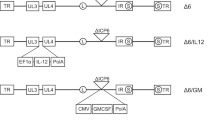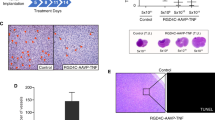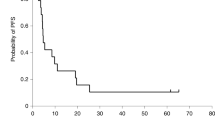Abstract
Immunotherapy in combination with suicide gene therapy for breast cancer was tested using a metastatic animal model. Subcutaneous injection of the nonimmunogenic breast cancer cell line 4T1 in BALB/C mice gave rise to tumors in 100% of mice with both micrometastases and macrometastases in the lung. We used the herpes simplex virus thymidine kinase (HSV-TK) gene along with the cytokine genes granulocyte-macrophage colony-stimulating factor (GM-CSF) and interleukin-2 (IL-2) to determine their effect on tumor regression and inhibition of lung metastasis. Adenoviral (AV) vectors carrying these transgenes, in separate constructs, were used in this study. Intratumoral administration of AV-TK followed by 10 days of ganciclovir treatment resulted in a delay in tumor growth and, in some cases, in a low to moderate reduction in tumor volume. Inclusion of either GM-CSF or IL-2 gene with HSV-TK resulted in a slightly greater reduction in tumor volume, although these data were not significantly different from those obtained for TK treatment alone. However, when both cytokine genes were combined with TK, a substantial reduction in tumor growth was observed compared with HSV-TK alone (P < .02). Tumor weight data also exhibited superior efficacy of TK/GM-CSF/IL-2 treatment when compared with animals treated with TK gene only (P < .01). More importantly, TK/GM-CSF/IL-2 combination gene therapy induced a significant reduction in lung metastasis compared with any other treatment groups in the 4T1 model (P < .001 between TK GM-CSF/IL-2 versus TK only). Surgical excision of primary tumors after TK/GM-CSF/IL-2 plus ganciclovir treatment resulted in anti-metastatic activity that was similar to that observed for animals in which no surgery was performed. Survival analysis showed a significant difference between animals treated with AV-TK/GM-CSF/IL-2 and animals treated with TK only at 35 days after virus injection (P < .01). Immunophenotypic data suggest infiltration of lymphocytes within the tumor microenvironment in TK- and cytokine gene-treated animals. Thus, the overall data presented here demonstrate that TK gene therapy in combination with GM-CSF and IL-2 gene-mediated immunotherapy strategies have important implications in the treatment of breast cancer.
This is a preview of subscription content, access via your institution
Access options
Subscribe to this journal
Receive 12 print issues and online access
$259.00 per year
only $21.58 per issue
Buy this article
- Purchase on Springer Link
- Instant access to full article PDF
Prices may be subject to local taxes which are calculated during checkout
Similar content being viewed by others
Author information
Authors and Affiliations
Corresponding author
Rights and permissions
About this article
Cite this article
Majumdar, A., Zolotorev, A., Samuel, S. et al. Efficacy of herpes simplex virus thymidine kinase in combination with cytokine gene therapy in an experimental metastatic breast cancer model. Cancer Gene Ther 7, 1086–1099 (2000). https://doi.org/10.1038/sj.cgt.7700215
Received:
Accepted:
Published:
Issue Date:
DOI: https://doi.org/10.1038/sj.cgt.7700215
Keywords
This article is cited by
-
Tumor-derived granulocyte colony-stimulating factor diminishes efficacy of breast tumor cell vaccines
Breast Cancer Research (2018)
-
Therapeutic properties of a vector carrying the HSV thymidine kinase and GM-CSF genes and delivered as a complex with a cationic copolymer
Journal of Translational Medicine (2015)
-
Enforced effect of tk-MCP-1 fusion gene in ovarian cancer
Journal of Experimental & Clinical Cancer Research (2012)
-
Suicide gene and cytokines combined nonviral gene therapy for spontaneous canine melanoma
Cancer Gene Therapy (2008)
-
Gene therapy for carcinoma of the breast
Cancer Gene Therapy (2006)



